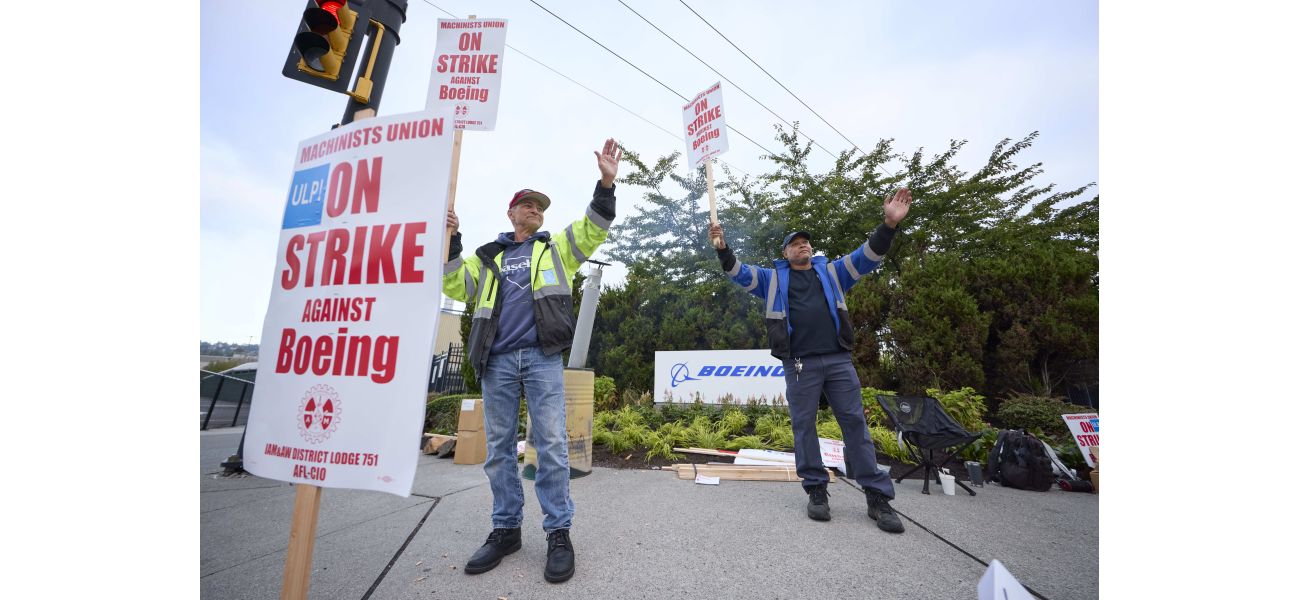Boeing employees strike after turning down contract proposal.
33,000 machinists' strike won't affect flights now, but will halt production of Boeing's top-selling planes, adding to company's woes.
September 13th 2024.

On Friday, something big happened at Boeing factories in Washington, Oregon, and California. The aircraft assembly workers went on strike, and it wasn't just a few of them - it was a whopping 33,000 machinists. The reason? They had rejected a tentative contract that would have given them a 25% increase in wages over four years. That's a lot of money, but the union members didn't think it was enough.
This strike isn't going to immediately cause any disruptions in commercial flights, but it is going to affect the production of Boeing's most popular planes. For a company that's already struggling with a damaged reputation and financial losses, this is just another setback. In fact, the stock for Boeing was down 2.2% in morning trading, adding to their year-to-date loss of 38.9%.
The strike began just three hours after the regional branch of the International Association of Machinists and Aerospace Workers announced that the majority of voting workers had rejected the contract and decided to walk off the job. As the clock struck midnight, workers gathered outside the Renton, Washington factory with signs expressing their dissatisfaction with the proposed contract. They honked car horns and blasted songs like "We're Not Gonna Take It" and "Look What You Made Me Do."
One of the main reasons for the strike was a recent decision by the company to change the criteria for annual bonuses. Many workers also felt that the wage increase offered was not enough, especially considering the rising cost of living in the Pacific Northwest. One worker, John Olson, shared that he had only received a 2% raise in his six years at Boeing. He pointed out that the last time they negotiated a contract was 16 years ago, and the company was still basing wage increases on that outdated number without taking into account inflation.
According to Boeing, the average salary for these machinists is $75,608 per year, not including overtime. Under the proposed contract, this would have increased to $106,350 by the end of four years. However, this offer fell short of the union's initial demand for a 40% raise over three years. The union also wanted to bring back traditional pensions that were eliminated ten years ago, but they settled for an increase in Boeing's contributions to employee 401 retirement accounts instead.
Aside from the wage increase, the rejected contract also included a $3000 lump sum payment and a reduced share of healthcare costs. Boeing had also agreed to build their next new plane in Washington state, which was a key demand for the union. Now, the president of the union local, Jon Holden, says they will survey members to determine which issues they want to prioritize in future negotiations. In response to the strike, Boeing released a statement saying they were "ready to get back to the table to reach a new agreement" and acknowledged that the rejection of the tentative contract was a clear message from the workers.
Unfortunately, this has been a tough year for Boeing. From a panel blowing out on one of their planes in January to a malfunctioning spacecraft leaving astronauts stranded in space, things have not been going well. The striking machinists are responsible for assembling the company's most popular planes: the 737 Max, 777 jet, and 767 cargo plane. While the strike may not halt production of the Boeing 787 Dreamliners, which are built by non-union workers in South Carolina, it will definitely impact the company's cash flow since they will not be able to deliver new planes to airlines.
The new CEO, Kelly Ortberg, who took the reins just six weeks ago, is facing yet another challenge. He made a last-ditch effort to save the contract, but it wasn't enough. In a meeting with the machinists, he stressed the importance of reaching a resolution and avoiding a strike. He also acknowledged the company's struggles in recent years and expressed his belief that they could turn things around together. But now, he has to navigate the strike and try to regain the trust of their airline customers.
According to union leader Holden, the machinists were not happy with the current state of things. They felt like their wages had been stagnant for too long, and they had made concessions over the years to keep their jobs from being moved elsewhere. This strike is about more than just money - it's about respect and fighting for their future. And depending on how long it lasts, it could cost Boeing a significant amount of money. In 2008, an eight-week strike cost them about $100 million a day in deferred revenue. Analysts predict that this strike could cost them $3 billion, based on inflation and current production rates.
One of the striking workers, Solomon Hammond, is prepared to stay on strike for as long as it takes to get a better contract. He feels that the wages offered just don't reflect the current cost of living. As an experienced toolmaker, he makes $47 an hour but still struggles to make ends meet. He, like many of his colleagues, is willing to fight for a better future.
This strike isn't going to immediately cause any disruptions in commercial flights, but it is going to affect the production of Boeing's most popular planes. For a company that's already struggling with a damaged reputation and financial losses, this is just another setback. In fact, the stock for Boeing was down 2.2% in morning trading, adding to their year-to-date loss of 38.9%.
The strike began just three hours after the regional branch of the International Association of Machinists and Aerospace Workers announced that the majority of voting workers had rejected the contract and decided to walk off the job. As the clock struck midnight, workers gathered outside the Renton, Washington factory with signs expressing their dissatisfaction with the proposed contract. They honked car horns and blasted songs like "We're Not Gonna Take It" and "Look What You Made Me Do."
One of the main reasons for the strike was a recent decision by the company to change the criteria for annual bonuses. Many workers also felt that the wage increase offered was not enough, especially considering the rising cost of living in the Pacific Northwest. One worker, John Olson, shared that he had only received a 2% raise in his six years at Boeing. He pointed out that the last time they negotiated a contract was 16 years ago, and the company was still basing wage increases on that outdated number without taking into account inflation.
According to Boeing, the average salary for these machinists is $75,608 per year, not including overtime. Under the proposed contract, this would have increased to $106,350 by the end of four years. However, this offer fell short of the union's initial demand for a 40% raise over three years. The union also wanted to bring back traditional pensions that were eliminated ten years ago, but they settled for an increase in Boeing's contributions to employee 401 retirement accounts instead.
Aside from the wage increase, the rejected contract also included a $3000 lump sum payment and a reduced share of healthcare costs. Boeing had also agreed to build their next new plane in Washington state, which was a key demand for the union. Now, the president of the union local, Jon Holden, says they will survey members to determine which issues they want to prioritize in future negotiations. In response to the strike, Boeing released a statement saying they were "ready to get back to the table to reach a new agreement" and acknowledged that the rejection of the tentative contract was a clear message from the workers.
Unfortunately, this has been a tough year for Boeing. From a panel blowing out on one of their planes in January to a malfunctioning spacecraft leaving astronauts stranded in space, things have not been going well. The striking machinists are responsible for assembling the company's most popular planes: the 737 Max, 777 jet, and 767 cargo plane. While the strike may not halt production of the Boeing 787 Dreamliners, which are built by non-union workers in South Carolina, it will definitely impact the company's cash flow since they will not be able to deliver new planes to airlines.
The new CEO, Kelly Ortberg, who took the reins just six weeks ago, is facing yet another challenge. He made a last-ditch effort to save the contract, but it wasn't enough. In a meeting with the machinists, he stressed the importance of reaching a resolution and avoiding a strike. He also acknowledged the company's struggles in recent years and expressed his belief that they could turn things around together. But now, he has to navigate the strike and try to regain the trust of their airline customers.
According to union leader Holden, the machinists were not happy with the current state of things. They felt like their wages had been stagnant for too long, and they had made concessions over the years to keep their jobs from being moved elsewhere. This strike is about more than just money - it's about respect and fighting for their future. And depending on how long it lasts, it could cost Boeing a significant amount of money. In 2008, an eight-week strike cost them about $100 million a day in deferred revenue. Analysts predict that this strike could cost them $3 billion, based on inflation and current production rates.
One of the striking workers, Solomon Hammond, is prepared to stay on strike for as long as it takes to get a better contract. He feels that the wages offered just don't reflect the current cost of living. As an experienced toolmaker, he makes $47 an hour but still struggles to make ends meet. He, like many of his colleagues, is willing to fight for a better future.
[This article has been trending online recently and has been generated with AI. Your feed is customized.]
[Generative AI is experimental.]
0
0
Submit Comment





